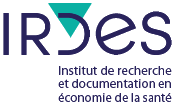|
Every quarter, find the latest health economics
news at IRDES: publications, seminars, interviews, detailed
figures and documentation tools.
 See
previous letters See
previous letters
Every month find the
French Newsletter
Spotlights
Charts
Documentation
 |
News: Getting Information on Public Health in France and in Europe
A selection of the major bibliographical and statistical resources on public health and related like health care system organisation in France and in other industrialised nations, epidemiology, social security, demographics, statistics...
Doc
Veille: Keep an Eye on Health Economics Literature
Produced by IRDES documentation centre,
Doc Veille, a bimonthly publication, presents by theme
the latest articles and reports in Health Economics:
both peer-reviewed and grey literature.
Selected
for You: Books, Links and Papers of the Month
Updated monthly, this section presents a
selection of books, websites and working papers
published by world-wide universities and research
institutes specialised in Health Economics and related
domains.
|
Forthcoming
 |
Next participation of Irdes Researchers
in International Conferences
- Laure Com-Ruelle will attend the Conference of Unit Executive for Funding Education Higher, Research Development and Innovation (UEFISCDI): Diaspora in Scientific Research and Higher Education in Romania - Diaspora and Friends, in Timisoara (Rumania), 25-28 April 2016.
- Zeynep Or and Magali Dumontet will attend the European Health Policy Group Spring (EHPG), Helsinki (Finland), 28-29 April 2016.
-
Yann Bourgueil will attend the Final Consultation on the European Framework for Action on Integrated Health Services Delivery, in Copenhague (Denmark), 2-4 May 2016 and the Policy dialogues of European Observatory on Health Systems and Policies, in Vienna (Austria), 19-20 May 2016.
- Paul Dourgnon will attend the 6th international Jerusalem conference on health policy: Health policy: from local experience to global patterns and back again, in Jerusalem (Israel), 23-25 May 2016.
- Damien Bricard, Magali Dumontet, Florence Jusot, Zeynep Or, Anne Penneau and Aurélie Pierre will attend the EuHEA Conference 2016, in Hamburg (Germany), 13-16 July 2016.
- Clément Nestrigue will attend the annual Congress of the Latin Association for Health Systems Analysis (ALASS), CALASS 2016, in Brasilia (Bresil), 21-23 July 2016.
|
|
Recent Publications
IRDES publishing

|
Older Adults' Satisfaction with Medical Care and care Coordination: A Qualitative Approach
Guillaume S. (IRDES) and Or Z. (IRDES)
Issues
in Health Economics (214), January 2016
This exploratory qualitative study aims to identify the dimensions of satisfaction with medical care and care coordination for older adults over age 70. Semi-structured interviews were conducted in spring 2015 with a sample of 18 people aged 72 to 90 years, living at home or in institution, as well as 4 informal carers looking after people suffering from cognitive problems. All respondents (including informal carers), regardless of their type of accommodation, agree that the most important dimension in medical care is the quality of their relationship with health professionals. There seems to be a significant room for improvement in that relational quality and people's satisfaction which can be achieved often by means of simple gestures. Respondents evoke the importance of being well informed about their care process, having the opportunity to express themselves; and they stress the importance of communication and coordination between different healthcare professionals involved in their care.
|
|
Measuring Polypharmacy in the Elderly: Impact of the Method on Prevalence and Therapeutic Classes
Le Cossec C. (IRDES) and Sermet C. (IRDES), in collaboration with Perronnin M. (IRDES)
Issues
in Health Economics (213), October 2015
Increased life expectancy is accompanied by an increase in years of living with one, or even several, chronic diseases causing an accumulation of drug therapies, thus increasing the iatrogenic risks. In recent years, public policies to reduce polypharmacy in the elderly have been established. Their assessment requires easy-to-produce indicators from large population databases. Two indicators are considered here: the "cumulative" polypharmacy indicator, which takes into account all drugs administered over a given period, and the "continuous" polypharmacy indicator, which focuses on drugs taken regularly over a prolonged period of time. The innovative aspect of this work is the consideration of combination drugs and quarterly packs in the calculations. The polypharmacy prevalence varies from 27% to 40% depending on the indicator, with or without consideration of the combination drugs and large packs.
|
IRDES researchers' publications in other venues

|
Variation in Rates of Breast Cancer Surgery: A National Analysis Based on French Hospital Episode Statistics
Rococo E., Mazouni C., Or Z., Mobillion V., Koon Sun Pat M., Bonastre J., European Journal of Surgical Oncology (EJSO), vol 42, n° 1, 2016/01, 51-58.
Supplemental Health Insurance and Healthcare Consumption - A Dynamic Approach to Moral Hazard
Franc C., Perronnin M., Pierre A., Health Economics, on line 15/10/2015. |
3 questions to...
International Networks

|
- IRDES is hosting for four months, until July 2016, Ryozo Matsuda, professor of health policy at Ritsumeikan University in Japan, who will work on a comparative analysis of regional governance in France, England and Germany.
- The Piperska Group
Catherine Sermet is a member of The Piperska Group which is a multidisciplinary network of professionals who share the common vision of enhancing the health of the public and the individual patient in a sustainable way through exchanging ideas and cooperation around the rational use of pharmacological and related therapies.
 Next meeting: Leiden, The Netherlands, 31 May and 1 June 2016. Next meeting: Leiden, The Netherlands, 31 May and 1 June 2016.
|
Next Letter: July, 2016
|










